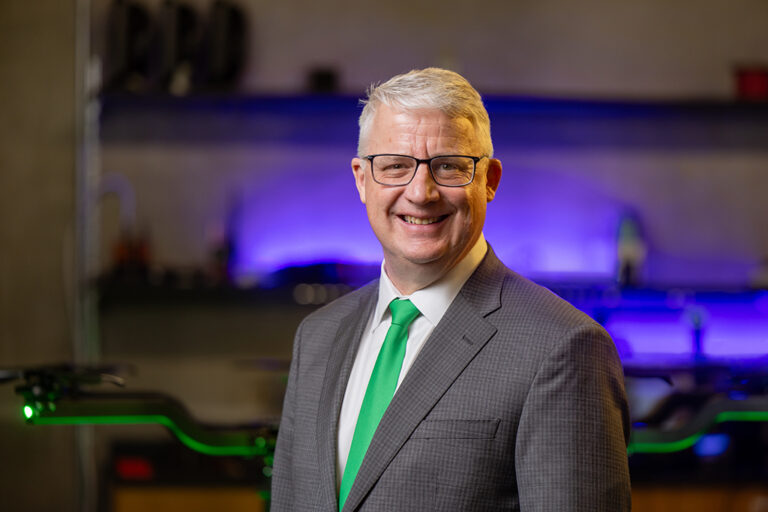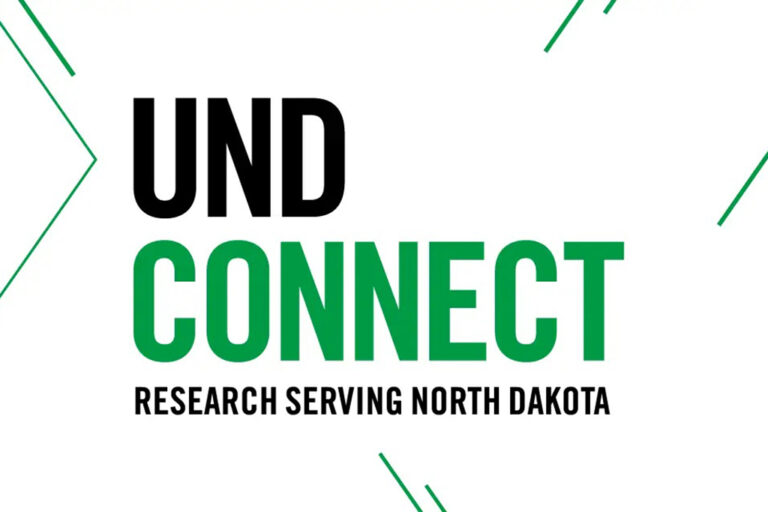Hooked on science
Students and former students reflect on the life, career impact of conducting research as undergraduates

Before making the leap to college, many students at least have an idea of what research is.
They see the lab coats, microscopes and test tubes in movies, news stories and other media (especially now, amidst one of the biggest vaccination efforts of all time).
But when curious minds arrive at a place like UND – the flagship research institution of North Dakota – they are enabled to find something deeper than what appears in pamphlets and stock images.
As UND Today describes elsewhere in today’s issue, Research Experiences for Undergraduates (REU) programs are federally funded initiatives to get college undergraduates involved in research. And according to UND’s experts, such programs help young people hone a variety of critical skills while making legitimate contributions to science.

For senior Grace Rerick, that journey of discovery hasn’t taken her a great distance (yet), given that she’s a lifelong Grand Forks resident. But her research experiences at UND, including being part of an REU, have given her opportunities to explore science in a way that has shaped her interests and goals.
The biology and honors major went from simply wondering about the “why” behind things happening in the world to finding out for herself. Now she wants to pursue clinical research in addition to achieving her dream of becoming a medical doctor.
“Studying something like biochemistry, for example, always made me want to know why things were happening, not just how,” Rerick said. “Over time I started to realize that my mind operates like that of a researcher. I wanted to dig into the details.”

In the case of Alyssa Erickson, another senior who came to UND with medical school in mind, she started to see the role research played in medicine when looking through the UND website.
“In high school, you know that research is a ‘thing’ in biology and medicine,” Erickson told UND Today. “But looking through UND’s programs, I saw how integral it is to those topics and the university experience.”
Her curiosity led her to working in a lab as soon as she got to UND, and she hasn’t looked back. Not only has she been able to work in multiple labs at UND, but also she has been able to mentor other students on a similar path toward discovery. Erickson’s experiences have driven her to pursue a career in academia.
“Right as I came to campus, I did work with DNA sequencing, and learning the process and seeing the results of my work got me totally hooked,” Erickson said.
Turning points through research, teaching
Where Erickson has really been “hooked” by research is in bioinformatics, or computational biology. In other words, the use of high-level processing power to examine large sets of data, and drawing biological explanations from those data. Through the “Genes & The Environment” REU program, under Professor Turk Rhen, Erickson did computer work to improve the genetic mapping of snapping turtles, work that she was able to perform remotely despite the COVID-19-related disruptions to research activity. Erickson had also been working in Rhen’s lab during the academic year.
Rhen spoke highly of Erickson’s inquisitiveness, attention to detail and ability to meaningfully contribute to his research projects – to the point of Erickson becoming a co-author on a paper recently published in G3: Genes, Genomes, Genetics.
“Alyssa has done much of the work to improve our genome mapping to a chromosome-level assembly,” Rhen said. “In other words, the original DNA sequence that we described in the G3 paper was highly fragmented, with about 13,000 pieces. Alyssa has now assembled these pieces into 25 of the 26 chromosomes found in the snapping turtle.”

In addition to learning so much through her lab work, developing a new passion for examining the molecular levels of life using big data technology, the opportunity Erickson had to mentor a fellow undergraduate student represented a major turning point for her career. The student she mentored came from the East Coast for a summer, by means of an REU, and Erickson introduced the student to the lab life.
“Having that opportunity to mentor someone really showed me the importance of teaching and the value of realizing my own knowledge,” Erickson said. “It really solidified my interest in an academic career, and it also helped me think about research beyond the performance. This activity is just as much about sharing information and ensuring others learn from it.”

Perspective-changing experience
This past summer, Rerick was among the first few students to participate in a new research fellowship through the American Society for Pharmacology and Experimental Therapeutics (ASPET). Similar to Erickson, Rerick’s experiences have changed her perspective about the tenets of research just as much as she has advanced her skills of inquisition.

“I got involved with ASPET because I didn’t want to take a break from researching during the summer,” said Rerick, who has been working under Associate Professor L. Keith Henry since the start of her junior year. “It ended up presenting another way of looking at research that I had not yet been exposed to.”
For her project, she helped examine the effects of antidepressant drugs on babies in utero, to see how genetics may be altered if a mother-to-be is taking such drugs during the final phases of pregnancy. The work satisfied Rerick’s desire for more experience, but it also gave her valuable insight into science as a collaborative venture.
“Before, I had thought everyone was in their own lab, their own zone,” Rerick said. “But being able to talk to other PIs and other students through the program showed me that this is one big team sport, in a way. ASPET introduced me to the ‘community’ of scientific research.”
She feels a certain amount of gratitude toward UND for helping her make such discoveries. In her words, it’s not at every institution that undergraduates can have the opportunities she’s had to discover their true interests, she believes.
“Getting exposure to working with pharmacology has made me realize that in day-to-day life, I’m constantly questioning how the medicines we take are affecting our brains,” Rerick said. “The opportunities I have had to work in research labs have changed my perspective a lot. And I have been free to explore a variety of topics.”
Before Rerick took advantage of the opportunities in front of her, she was 100 percent set on just being a medical doctor – a general practitioner. She could have very well maintained that path and worked her way through medical school.
“But as soon as I got into research, I loved it so much,” she said. “I realized it was a great fit for me, and I have since decided that I want to look at both M.D. and Ph.D. going into graduate school.”
Finding the excitement of discovery
Ryan Zerr is a professor and associate dean at UND’s College of Arts & Sciences who can instantly relate to an experience such as Rerick’s, where research experience at a formative time changed his career’s trajectory.
That’s because while studying atmospheric sciences at UND in the 1990s, Zerr was able to take on a summer project studying thunderstorms and the environmental conditions that produce them.

“I was able to see the scientific process from beginning to end, from data collection to disseminating results to the scientific community,” said Zerr. His summer work at the time resulted in further opportunities, and subsequently sparked a career in mathematics, which he now teaches in addition to his department chair duties for UND’s Theatre Arts program.
The progression of Zerr’s career has taken him full circle, to now being one of the dozens of faculty members bringing students into research environments as mentors. This past week marked the fifth annual UNDergraduate Showcase – an event he developed for students to present their work to the interested public.
The Showcase is certainly a valuable exercise in communication, in the way students deliver research results and impact to a lay audience, but Zerr finds significant value in the excitement of discovery that he and UND research faculty deliver through their mentorship.
“Not to oversimplify what it is we do, but there are few things cooler than the idea of being the first person to discover something,” he said. “That’s what got me hooked, and that’s what I try to help students find in their own work.”



